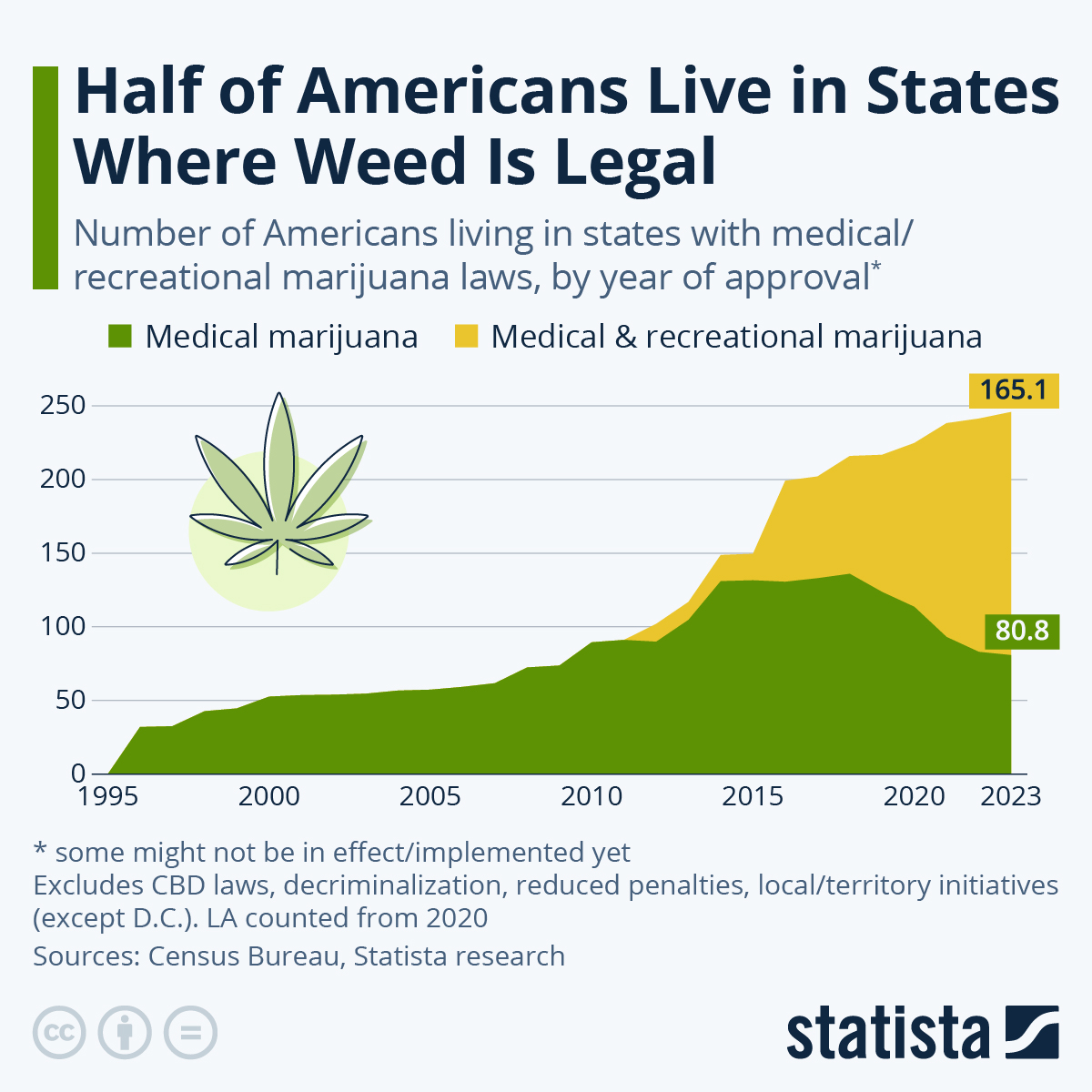
This week in August 2013, the U.S. government cleared the way for the legalization of marijuana in the country, as the Justice Department stated in a press release that it was not going to enforce federal law prohibiting the drug's use in states that were launching recreational cannabis programs at the time.
Ten years down the line, half of Americans live in states where marijuana is legal and another 80 million have access to medical marijuana.
As Statista's Katharina Buchholz notes, this means that almost three quarters of U.S. residents live in a state with some sort of legal weed.
You will find more infographics at Statista
In 2013, it was Colorado and Washington which were gearing up to legalize marijuana after successful ballot initiatives as part of the November 2012 elections.
But the federal government's policy statement was also relevant for another 18 states and the District of Columbia, which at the time had already legalized medical marijuana.
Data from the Census Bureau shows that between 2012 and 2014, a substantial number of people continued to gain access to medical marijuana as larger states like Massachusetts and Illinois passed measures.
After that year, shifts to recreational weed legislation dominate the statistic with significant legalizations in California (2016), Michigan (2018), New Jersey (2020) and New York (2021), effectively lowering the number of people under medical marijuana legislation only.
Despite this, a total of 14 states have passed medical marijuana ballots or legislation after 2015, including Pennsylvania, Ohio, Florida, Utah and most recently Kentucky.
And today, Bloomberg reports that US health officials are recommending easing restrictions on marijuana, a move that sets the stage for potentially expanding the cannabis market.
A top official at the Department of Health and Human Services wrote Drug Enforcement Agency Administrator Anne Milgram calling for marijuana to be reclassified as a Schedule III drug under the Controlled Substances Act, according to a letter dated Aug. 29 seen by Bloomberg News.
With the health department’s recommendation in hand, the DEA must now conduct its own review process before coming to a decision.
Should the DEA reclassify marijuana, it would mark a critical shift away from its status as a Schedule I substance, which includes drugs with high abuse risk, like heroin, LSD and ecstasy.
This week in August 2013, the U.S. government cleared the way for the legalization of marijuana in the country, as the Justice Department stated in a press release that it was not going to enforce federal law prohibiting the drug’s use in states that were launching recreational cannabis programs at the time.
Ten years down the line, half of Americans live in states where marijuana is legal and another 80 million have access to medical marijuana.
As Statista’s Katharina Buchholz notes, this means that almost three quarters of U.S. residents live in a state with some sort of legal weed.
You will find more infographics at Statista
In 2013, it was Colorado and Washington which were gearing up to legalize marijuana after successful ballot initiatives as part of the November 2012 elections.
But the federal government’s policy statement was also relevant for another 18 states and the District of Columbia, which at the time had already legalized medical marijuana.
Data from the Census Bureau shows that between 2012 and 2014, a substantial number of people continued to gain access to medical marijuana as larger states like Massachusetts and Illinois passed measures.
After that year, shifts to recreational weed legislation dominate the statistic with significant legalizations in California (2016), Michigan (2018), New Jersey (2020) and New York (2021), effectively lowering the number of people under medical marijuana legislation only.
Despite this, a total of 14 states have passed medical marijuana ballots or legislation after 2015, including Pennsylvania, Ohio, Florida, Utah and most recently Kentucky.
And today, Bloomberg reports that US health officials are recommending easing restrictions on marijuana, a move that sets the stage for potentially expanding the cannabis market.
A top official at the Department of Health and Human Services wrote Drug Enforcement Agency Administrator Anne Milgram calling for marijuana to be reclassified as a Schedule III drug under the Controlled Substances Act, according to a letter dated Aug. 29 seen by Bloomberg News.
With the health department’s recommendation in hand, the DEA must now conduct its own review process before coming to a decision.
Should the DEA reclassify marijuana, it would mark a critical shift away from its status as a Schedule I substance, which includes drugs with high abuse risk, like heroin, LSD and ecstasy.
Loading…





